by Brian Hioe
語言:
English
Photo Credit: Makoto Lin/Presidential Office/CC BY 2.0
IMAGINE IF AFTER Russia’s invasion of Ukraine that a leading Anglophone left academic journal put out an article blaming the invasion on the failure of Ukrainians to embrace Russian culture. Putin justified the invasion by claiming that Ukraine did not have a language, identity, or culture of its own outside of Russian culture and was wholly an invention of the Bolsheviks, so Ukraine’s existence as a polity could justifiably be nullified. The invasion of Ukraine, then, is the fault of Ukrainians for failing to embrace the “Russo-world”.
Though we are far from anything on the scale of the invasion of Ukraine, this line of thinking seems to have been the response of leading left-wing East Asia studies journal Positions to recent Chinese military threats directed at Taiwan, with an article published on its imprint Positions Politics by Kaohsiung-based professor Mark McConaghy. The article rightly points to some of the contradictions underlying the recent visit to Taiwan by US Speaker of the House Nancy Pelosi, following which China began conducting live-fire drills around Taiwan. But McConaghy’s article then takes a bizarre turn to suggest that the DPP’s Taiwanese nationalism is at fault for the crisis, which supposedly could have been averted if the DPP had not denied Taiwan’s Chinese roots–referred to in the article as its disavowal of Zhonghua.
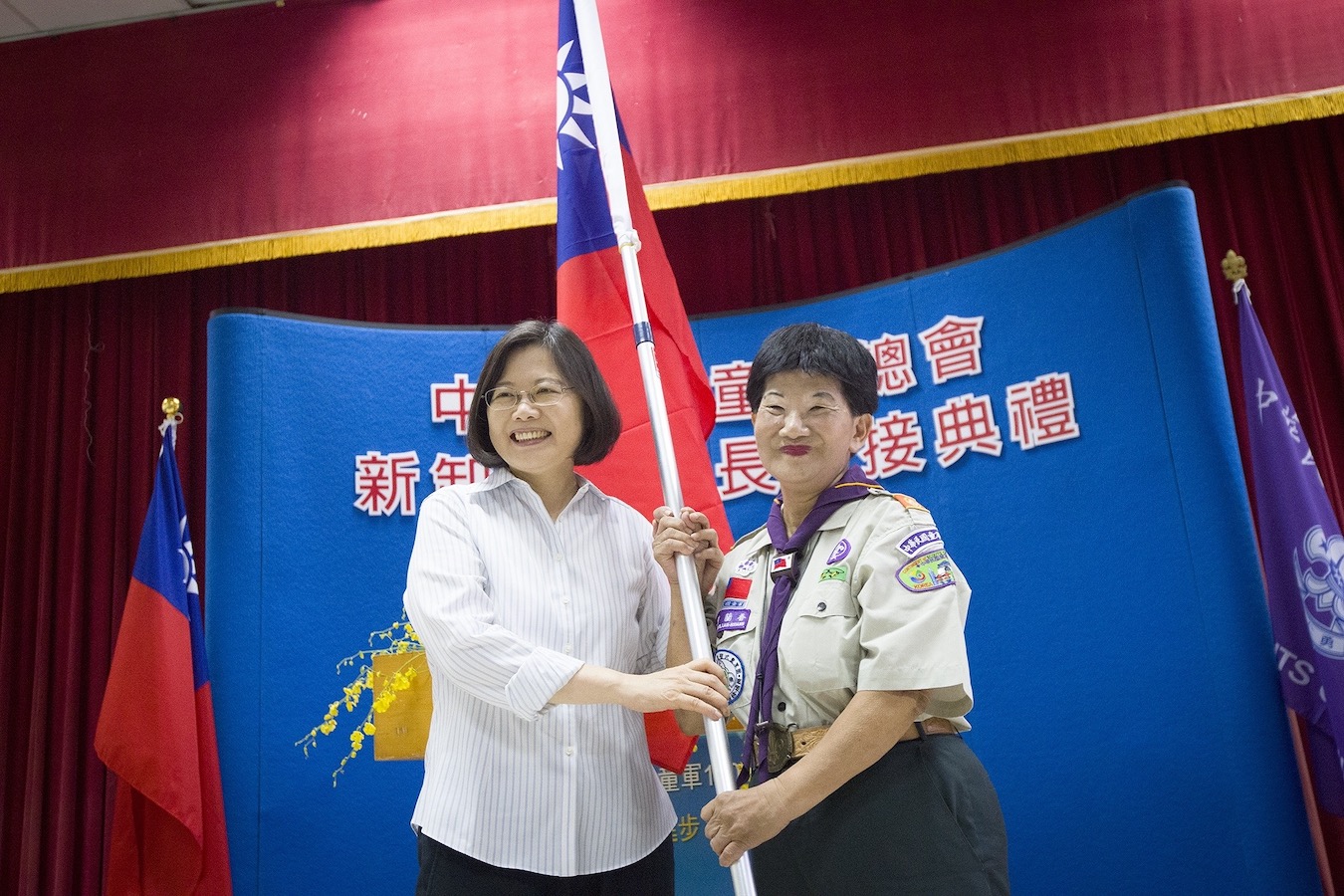 Taiwanese president Tsai Ing-wen holding the ROC flag (left) in a 2016 photo. Photo credit: Presidential Office/Flickr/CC BY 2.0
Taiwanese president Tsai Ing-wen holding the ROC flag (left) in a 2016 photo. Photo credit: Presidential Office/Flickr/CC BY 2.0
In the article, Zhonghua proves a somewhat slippery concept that refers to a notion of the Chinese nation, a nation that is often defined in cultural rather than geographical terms. Zhonghua is the term used in the name of the rump state that the KMT brought to Taiwan after its defeat in the Chinese Civil War, the “Chinese” in the “Republic of China,” the official name by which Taiwan is known today. The “Chinese” in the “People’s Republic of China” also references Zhonghua. For McConaghy, Zhonghua is a broad civilizational term that encompasses everyone who adheres to the Han cultural values and identity of Zhonghua. Following this logic, one could refer to Uyghurs as part of the “Zhonghua Race” (中華民族) despite the obvious fact that they are not Han, as sometimes already occurs.
Strangely, Positions itself claims McConaghy’s argument to be an “anti-national” stance on the Taiwan question. Yet while the article is highly critical of Taiwanese nationalism, does it do any better to simply try and replace Taiwanese nationalism with another, even more expansive form of nationalism? Which is to say, a Chinese nationalism defined in cultural or civilizational terms.
Material, Not Ideological Drivers for Chinese Expansion
ONE GREATLY wonders why Positions Politics did not seek any Taiwanese perspectives on the issue, though at the very least the author is a resident of Taiwan. But the article proves a typical example of when academics in the humanities seem to imagine that their work is politically impactful and scarcely have any awareness of the realities of global capitalism or imperial military power outside of the capacity to discuss, say, literature or poetry through an ostensibly leftist lens and nothing about economics or geopolitics. All too typical of the ivory tower.
As Marx said over a century ago about flipping Hegel on his head and setting him upright, McConaghy’s article fails to be attentive to the material conditions that drive China’s desire for national expansion and instead chooses to only note the ideological undergirdings of imperial expansion. After all, if Taiwan were to embrace traditional Chinese culture, China would not drop its threats of military invasion. China desires Taiwan for reasons that exceed cultural nationalism.
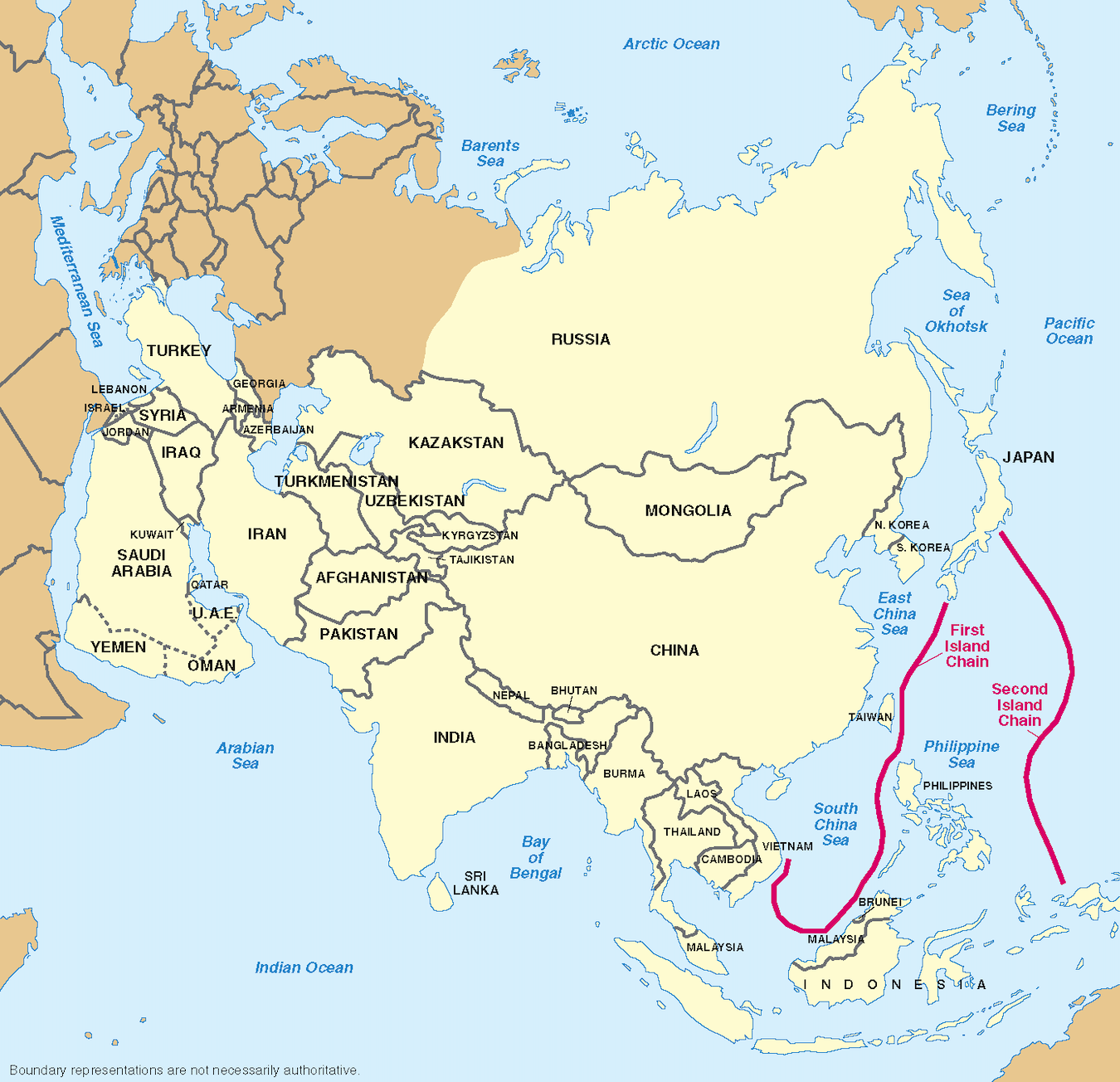 The boundaries of the so-called “First Island Chain”, which includes Taiwan. Photo credit: DoD/Public Domain
The boundaries of the so-called “First Island Chain”, which includes Taiwan. Photo credit: DoD/Public Domain
China’s drive for Taiwan is driven by geostrategic and geopolitical aims, as is Taiwan located at a key geographic node that China would need to occupy if it hopes to expand maritime power into the Pacific. Likewise, China and much of the world are reliant on Taiwan’s prowess in semiconductor fabrication for manufacturing advanced electronic products. Obtaining control of Taiwan’s semiconductor fabrication processes would allow China to have a powerful lever on the global economy; however, the logistical challenges of conducting a military occupation of Taiwan without inadvertently destroying sensitive infrastructure used for fabrication or accidentally killing those with the know-how for advanced manufacturing processes are hard to surmount.
Indeed, China’s claims over Taiwan as an integral part of its territory that requires prompt reunification are fairly historically recent. Mao himself seemed to entertain the possibility of putting the Taiwan question aside for a century or more in comments with US President Richard Nixon in the 1970s. Furthermore, in the 1940s, Mao seemed to consider Taiwan a separate country altogether. Cultural nationalist claims over Taiwan do not drive China’s desire for Taiwan; rather, cultural nationalist claims over Taiwan rose to prominence once Taiwan became materially valuable for China’s desire to expand national power outward.
Imperial Scorn for Post-Coloniality
MCCONAGHY IS right to point out that Pelosi’s visit is primarily an attempt to depict the Democratic Party as tough on China and hence grandstanding for the sake of US domestic politics while leaving Taiwan in the lurch. At the same time, he cannot help but lash out at details of Pelosi’s trip in a manner that is highly condescending to Taiwanese people.
McConaghy tries to frame the DPP as painting over the history of Japanese occupation by pointing to how the Presidential Office is located in a former Japanese colonial government building. Yet it is the Chinese Nationalist Party–an advocate of McConaghy’s beloved Zhonghua–that decided after it came to Taiwan that the Presidential Office should continue to be located there. Indeed, the KMT’s decision to maintain the Presidential Office within the former Japanese governor-general’s office draws attention to how the KMT succeeded the Japanese as Taiwan’s colonizers. The layering of histories and meanings seen in the Presidential Office further draws our attention to Taiwan’s post-coloniality as a site of serial colonialisms and a place that is still in the process of working through this past. This is simply the condescension of a western academic who can cling to a standpoint of absolute moral and ideological purity and sneer at places struggling with a messy postcolonial past.
McConaghy’s scorn for Taiwan’s postcolonial dilemma is further apparent in his condescension towards that Pelosi “even found time to stroll around the grounds” of the Jingmei Human Rights Memorial Park, a former jail for political dissidents during the authoritarian period that has been turned into a museum, as part of what he views as Pelosi “luxuriating” in photo ops. Pelosi’s stop there was meant as signaling, seeing as while at the park, she met with former political prisoners of China, including Taiwanese human rights NGO worker Lee Ming-che, Hong Kong Causeway Bay bookseller Lam Wing-kee, and former Tiananmen Square student leader Wuerkaixi.
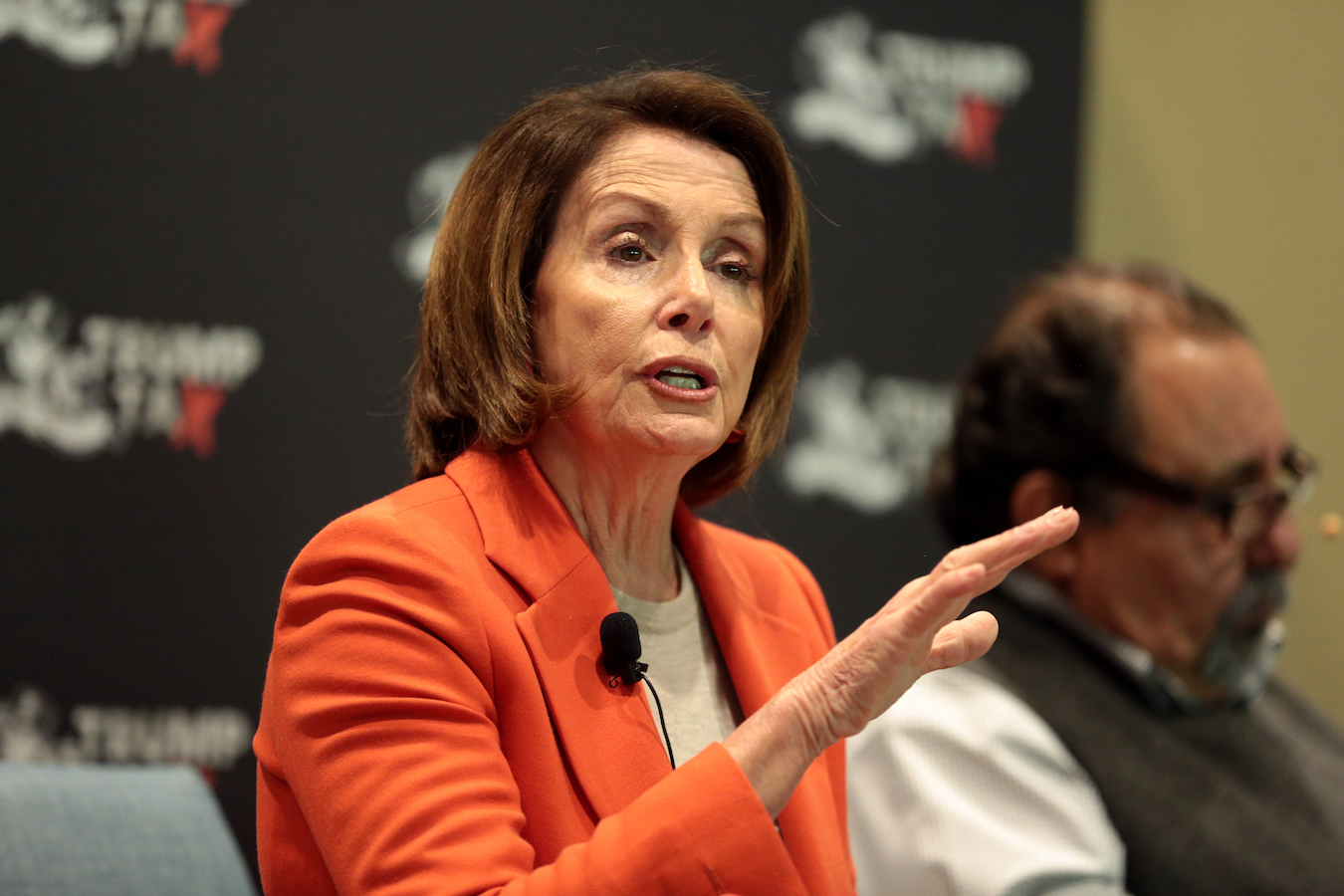 US Speaker of the House Nancy Pelosi. Photo credit: Gage Skidmore/WikiCommons/CC BY-SA 2.0
US Speaker of the House Nancy Pelosi. Photo credit: Gage Skidmore/WikiCommons/CC BY-SA 2.0
Certainly, he is right to criticize Pelosi’s visit there as hypocritical, particularly in light of the US carceral state or its actions abroad, such as CIA-operated Black Sites. And yet, while referencing the history of the park as a KMT detention center, McConaghy makes it sounds as though visiting the Jingmei Human Rights Memorial Park was as though it were some expensive restaurant for wining and dining, and he makes no reference of who she met there.
Next McConaghy turns toward the claim, “Flash forward twenty-four hours, and the excited local cheerfulness over official American attention in Taiwan has turned into fretful anxiety over live-fire military exercises around the island launched by the People’s Liberation Army.”
But in what world was that true? Taiwanese generally did not react to the military drills, or economic measures by China directed at Taiwan, with domestic media remaining more focused on a plagiarism scandal affecting the DPP’s Taoyuan mayoral candidate. Literal essay after essay have already been written about how substantially different international perceptions of the visit and reactions within Taiwan were, with calm prevailing in Taiwan, yet somehow despite being located in Taiwan, McConaghy’s perception seems to more accord with perceptions from outside Taiwan than within.
Embracing the Historical Standpoint of Authoritarian Nostalgia
MCCONAGHY IS right to cite the examples of Afghanistan, Korea, Iraq, and Vietnam to criticize a naive trust in and over-reliance on the US. But in making this point, McConaghy seems to think that Taiwanese people are stupid and not aware of the existential danger of US involvement. Taiwanese people are, contrary to what McConaghy might lead readers to think, aware of that the US backed KMT authoritarian rule for decades; furthermore, this point is especially salient for the DPP, which rose out of the democracy movement against the KMT.
President Tsai Ing-wen herself was sabotaged by the US in her 2012 presidential bid, with a phone call placed to the Financial Times from the White House stating that the US did not have faith in Tsai to stand up to China. Namely, the US preferred that the KMT maintain power in Taiwan, never mind that Taiwan had just experienced its only non-KMT presidential administration under Chen Shui-bian.
As such, Tsai has been strategic in maintaining US support by always seeking to avoid coming off as a pro-independence provocateur the way that Chen was. She has been successful in this regard, but it would be ludicrous to think that she has forgotten when the US sought to throw her under the bus a decade ago.
Indeed, one can tell at a glance that McConaghy seems to live in some kind of deep Blue bubble world, with his article railing at Tsai for abandoning the 1992 Consensus and lashing out at her for “de-Sinicization.”
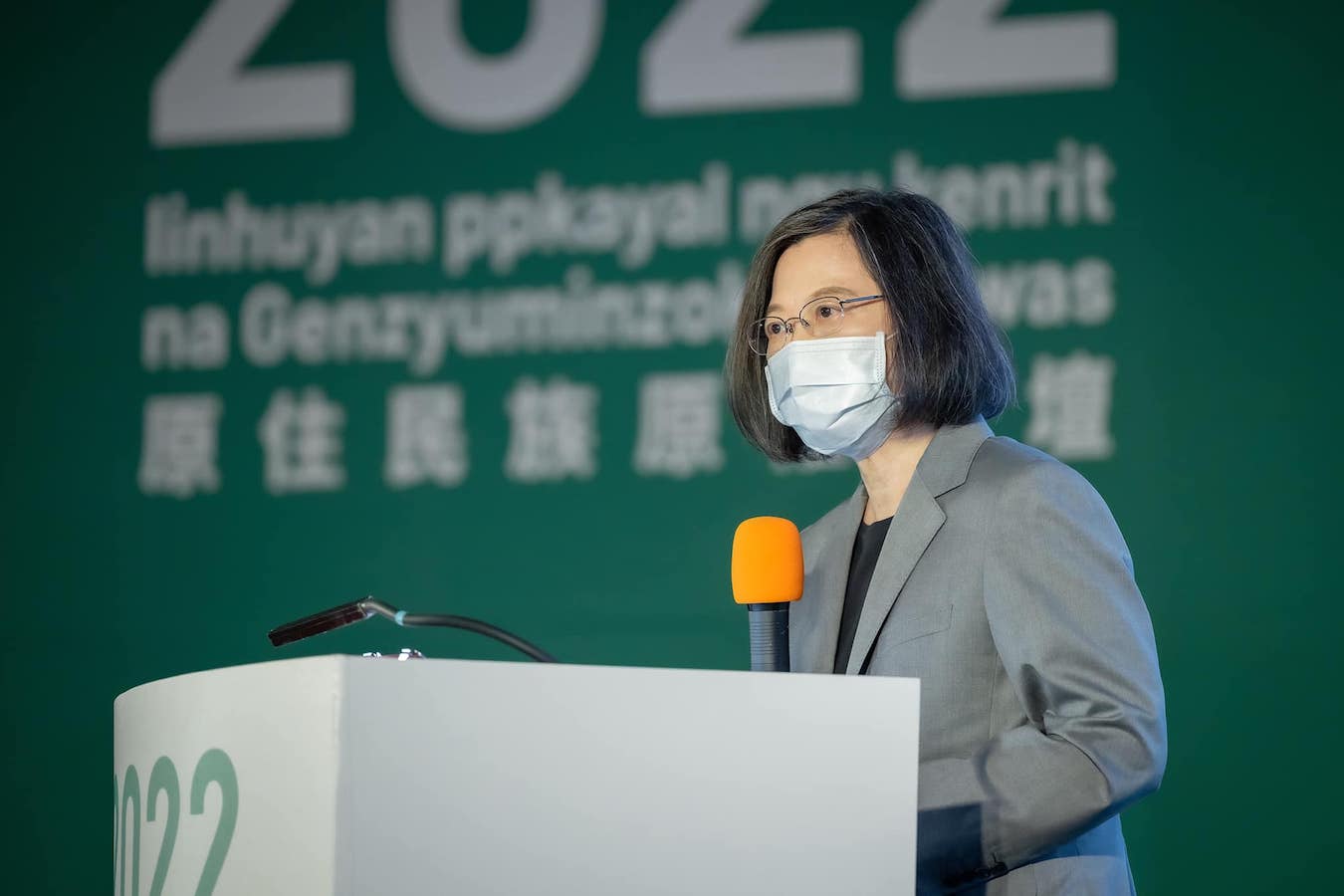 Tsai Ing-wen. Photo credit: Tsai Ing-wen/Facebook
Tsai Ing-wen. Photo credit: Tsai Ing-wen/Facebook
Tsai has indeed distanced herself from the 1992 Consensus, though McConaghy has made a factual error in suggesting that Tsai ever formally abandoned it at any point. But moving away from the 1992 Consensus seems hardly the key factor that has led to Chinese threats against Taiwan. Today, even successive KMT chairs such as Eric Chu and Johnny Chiang have publicly proposed dropping the 1992 Consensus. Such proposals were made as part of bids to win back public support at a time of declining popularity for the KMT. So it is hardly as though it is some unique fault of Tsai’s in distancing herself from the 1992 Consensus that has led to Chinese reprisals.
To this extent, as brought up numerous times in the article as another heinous crime of Tsai’s, the term “de-Sinicization” is a term bandied around by the pan-Blue camp to criticize the Tsai administration; this term has as much basis in reality as conservatives in the West that rally against “cultural Marxism” for brainwashing young people in colleges. “De-Sinicization” gets thrown at any assertions of Taiwanese identity, such as reducing the amount of teaching about dynastic Chinese history from thousands of years ago in high school textbooks in order to increase the amount of material about the history of Indigenous peoples in Taiwan and Taiwan’s four hundred years of Han settlement, or decreasing the amount of classical Chinese taught in schools in order to focus more on vernacular modern Chinese. This localized history proves to be closer at hand to the lived reality of contemporary Taiwanese young people than that of ancient Chinese history–not to mention McConaghy’s apparently being fine with the Indigenous erasure present in the KMT’s view of Taiwanese history as taught in schools since the authoritarian period.
Taiwanese Nationalism Bad, Chinese Nationalism Good?
AND YET THE hilarity of McConaghy’s proposal for a solution to avoid potential cross-strait conflict should be self-evident. As he puts it:
“The Sino-world may be on the precipice of war. The only responsible path forward is to rethink it in loose, flexible, but integrated ways, safeguarding the security, dignity, and peace of the multiple nations, peoples, regions, and societies that comprise it, while recognizing the manifold layers of its material and ideational past, as well as its potentially shared future.”
McConaghy has a highly binary view of what he terms Taiwanese nativism and “the Sino-world” –whatever that term might mean. But apart from the amorphousness of the concept, McConaghy seems to view the “Sino-world”–-that is to say, some notion of Chinese culture–as diverse.
But when historically has the “Sino-world” ever been anything other than a homogenizing project of Han supremacy? One can observe this project in the Han chauvinism of both the KMT and CCP alike, in the cultural and political suppression of China’s “ethnic minorities” or Taiwan’s Indigenous population in modern times, and in the treatment of Taiwan’s Indigenous peoples as ‘human-shaped animals’ who were hunted by Han settlers for medicinal ingredients in Qing era Taiwan. Indeed, one can situate McConaghy’s views alongside other bizarre attempts to depict historic Chinese nationalism as left-wing rather than simply being another form of nationalism, as in Andy Wang’s attempts to find some kind of productive leftist potential from the pan-Chineseness of the Baodiao movement (remind me of how nationalist squabbling over uninhabited rocks in the Pacific Ocean thought to have oil is a leftist cause again?).
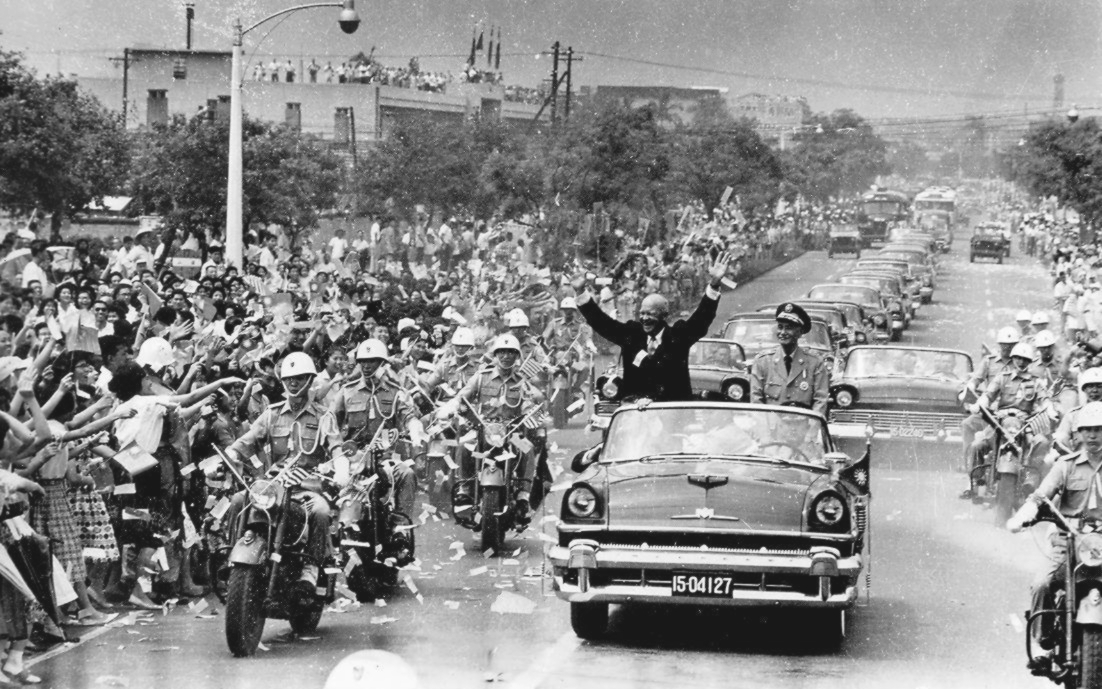 US President Dwight D. Eisenhower (left) and Chiang Kai-shek (right) during a parade. Photo credit: Public Domain
US President Dwight D. Eisenhower (left) and Chiang Kai-shek (right) during a parade. Photo credit: Public Domain
There is certainly a need to criticize Taiwanese nationalism, which has historically left out non-Han groups such as Indigenous peoples or more recently Southeast Asian migrants from its vision for the nation. But McConaghy instead proposes to turn back the clock to an age when the China-centered colonial education of the KMT dominated Taiwan. It does little to critique one form of nationalism for the sake of replacing it with an even more expansive one, especially one that was historically associated with authoritarianism in Taiwan.
While there have been proposals to invent a more open, imagined notion of China such as Joyce Liu’s “concept of China,” nations such as “Taiwan” or “China” are already invented, lived abstractions; hence, to speak of a “concept of China” (or Taiwan) that is more utopian than the actually existent one is a non-starter. To speak of a “concept of China” is simply to speak of China. This line of argumentation has also been made for the concept of the Sinophone, which relegates the concept to being nothing else except a version of “cultural China,” as in the work of David Der-wei Wang or a recent essay by Flair Shih.
Nor is McConaghy’s proposal at all realistic. Again, China has material, not ideological aims for its designs for Taiwan, and China would not suddenly cease military threats if Taiwan were to renew its commitment to some notion of cultural China. Because of its aims to expand geopolitical power, China requires political control of Taiwan.
McConaghy does criticize China, stating that: “For its part, Beijing must guarantee that no part of the Sino-world be subject to violence by any other part, and that differences across countries, states, ethnicities, and regions are respected.” But in what parallel dimension will the CCP suddenly do that, apropos of nothing? In other articles, McConaghy suggests such fantastical solutions as returning to early Soviet views on the national question, as though that would ever occur apropos of nothing for the CCP, or that the Soviet Union itself ever acted on Lenin’s sympathetic views towards national self-determination instead of veering sharply towards nationalism.
McConaghy seems to propose some kind of federalism for Taiwan to maintain its existing political freedoms. He states: “However, if the drums of war are to be silenced, some basic framework must be re-forged to bring cross-strait relations back onto a peaceful track. […] [W]e are speaking of a quiet federalism of dignity, mutual recognition, and peace.”
But, of course, one notes that China is already a nominal sort of federation, with “Special Autonomous Regions” for Xinjiang and Tibet, as well as Hong Kong’s special status under the framework of “One Country, Two Systems”. We see how this “quiet federalism” has worked out quite well with over one million Uyghurs imprisoned in “reeducation camps”, with militarized police violence against Hong Kong protestors in 2019, or with Hong Kong recently reaching the world’s highest death rate due to COVID-19 because of the PRC’s refusal to deviate from a COVID-zero policy even when this was no longer possible. As illustrated in the landslide victory of the DPP during the 2020 elections, which was in part propelled by reactions in Taiwan to the Hong Kong protests, Taiwanese are well aware of what would quickly take place with Taiwan’s political freedoms if it entered into some kind of federalism with China, in which China would hardly abide by any agreements to preserve freedoms, but in which the red line would always be shifting.
While McConaghy seems to lay the blame for tensions in the Taiwan Strait on the DPP’s nationalist obstinacy on cross-strait issues, if he at least bothered to Google or even just lift his head out of what is probably the deep Blue swamp of his department, he would know that Tsai has expressed willingness to engage in dialogue with China. Tsai has even expressed a willingness to fly to Beijing to conduct talks if such a meeting was conducted on the basis of equal treatment. All the more ludicrous that Positions Politics published the piece, given such basic fact-checking errors.
So at best, McConaghy is simply arguing that Taiwan abandon any efforts at maintaining its de facto sovereignty, while framing efforts at maintaining de facto sovereignty as only driven by nationalistic fervor and hatred of what is Chinese rather than simply wanting to be left alone. Moreover, he is arguing for an idea that would never gain traction among the public anyway and is increasingly politically dead in Taiwan.
And yet McConaghy recapitulates the KMT’s idealized view of the Ma administration as a time when cross-strait relations were at a peaceful idyll–never mind that the KMT’s actions were seen as compromising on Taiwan’s political freedoms and reminiscent of its past behavior during the authoritarian period such, provoking massive protests during the 2008 Wild Strawberry Movement and 2014 Sunflower Movement. The latter proved one of the largest social movements in Taiwanese history and a generational moment for contemporary Taiwanese young people, illustrating how young people do not accept efforts to push Taiwan closer to China, and do not identify as Chinese.
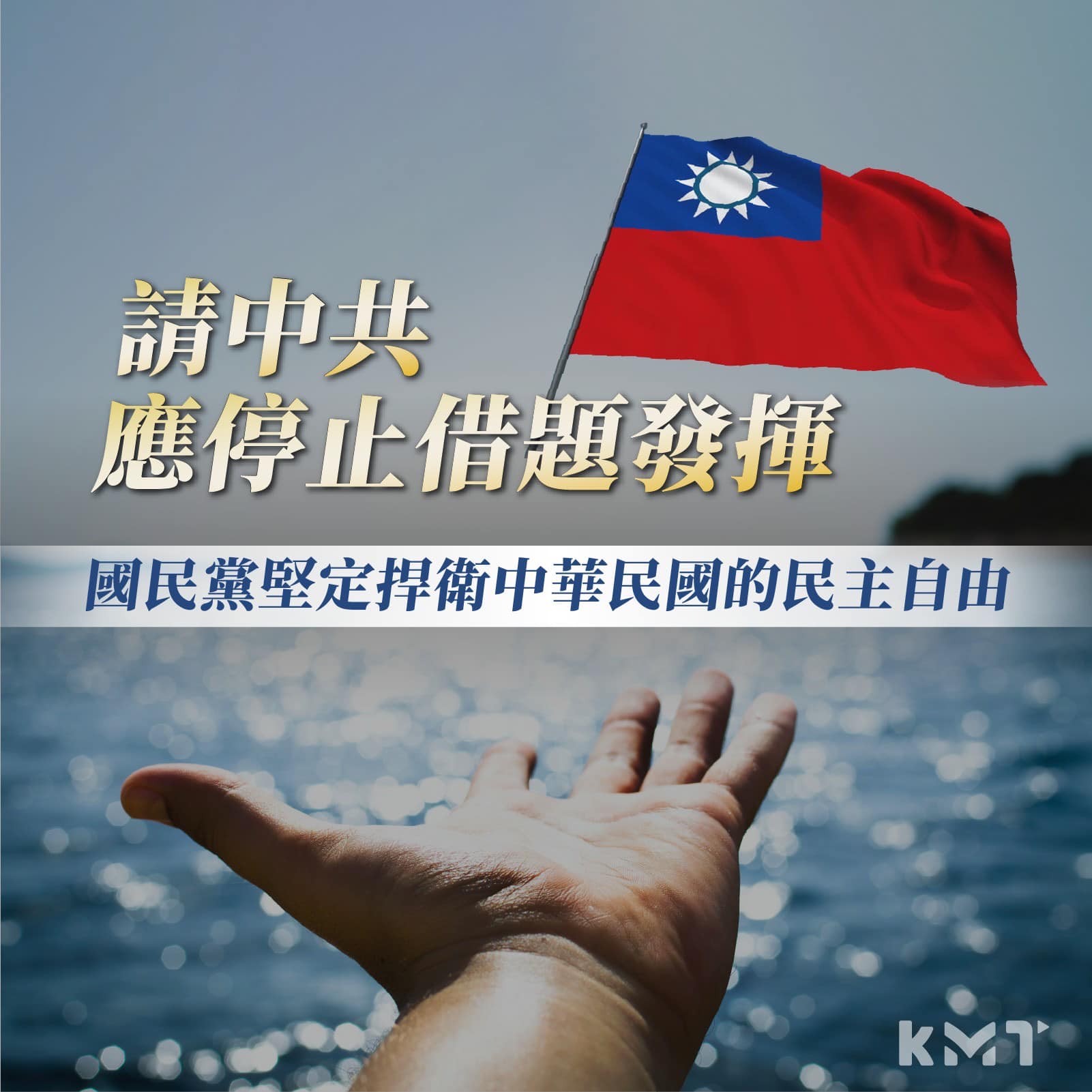 Photo credit: KMT/Facebook
Photo credit: KMT/Facebook
McConaghy’s move would be to appeal to an imagined unity based on shared culture and identity, one that ignores the reality of imperialism and colonial violence that Taiwan has been subjugated to historically, whether that be in terms of violence against Indigenous from Han settler colonialism, the Japanese colonial period, the KMT’s decades of authoritarian rule, or at present from the Chinese government. And McConaghy seems scarcely aware that to enforce that imagined unity requires a new form of uniformity, as is the case with all nationalisms. Imagined unity and peace have time and time again been the rhetorical smokescreen by which colonial and imperialist violence is justified.
Unsurprisingly, one finds McConaghy praising authoritarian apologists for the KMT’s political rule in other articles; for instance, Mou Zongsan, who justified Chiang Kai-shek’s authoritarian political leadership in metaphysical and existential terms in the course of his career as a thinker. Indeed, the future of Taiwan will be decided by Taiwanese young people and not by some white man’s Orientalist imaginings of a utopian vision of China that never existed and are largely drawn from apologists for the historically US-backed right-wing authoritarian KMT. As an internationalist, it seems rather basic that one must criticize all nationalisms whatsoever, rather than try and replace the nationalisms of comparatively small states with the nationalisms of infinitely larger, expansionist imperial states, but apparently this is too much to ask for.

